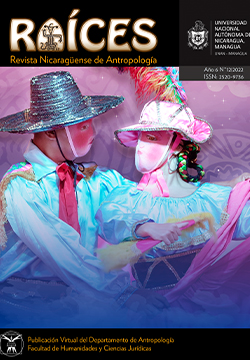The imagined pandemic:
conspiracy negationist knowledge produced in the covid-19 pandemic
DOI:
https://doi.org/10.5377/raices.v6i12.15577Keywords:
Conspiracy, denial, imaginary, knowledge, coronavirusAbstract
This research explains the knowledge created by various subjects who deny relevant aspects or the entirety of the current coronavirus pandemic. Its study is of vital importance to understand part of the current conflict since it makes visible a contest for the legitimacy of various discourses. This means that the negationist discourse is part of a knowledge system that includes conspiracy theories (CT), which are in dispute with the official-scientific discourses; From the ethnographic exploration it was possible to show how there is a contest of truths between these two poles. The base is based on the research carried out on the Facebook platform as a starting point for the study of conspiracy groups; From them I was able to obtain various transnational interviews and in the process I had the opportunity to extend the investigation towards the practices of conspiratorial denial narratives, since these materialize in the form of protests that are carried out monthly in Mexico City. Ethnography provided multiple knowledge since these social agents allowed me to see that this type of knowledge is not exclusive to subjects belonging to internet groups or groups of protesters, but rather it turned out to be made by “common” people who consume this knowledge. The research tries to shed light on the reasons that drive them to mistrust hegemonic discourses and promote theirs of an alternate nature where mythical imaginaries are the basis that sustains their discourse
Downloads
288
References
Besserer, Federico y Nieto, Raúl. (2015). La ciudad transnacional comparada. Modos de vida,
gubernamentalizad y desposesión. Universidad Autónoma Metropolitana Unidad Iztapalapa y Juan Pablos Editor, pp. 34
Castillón, Juan Carlos. (2014), Amos del mundo, Una historia de las conspiraciones. Debolsillo
Córdova Jiménez, Irene y Durán Montes Luis Alfonso. (2018), Las teorías de la conspiración y
su efecto sobre las decisiones: Argumentos inconsistentes para no vacunar. Una revisión de la literatura. Quadripartitaratio, año 3 #6.
Dyrendal, Asbjorn, Ottesen Kennair, Leif Edward y Bendixen, Mons. (2021) Predictors of belief in conspiracy theory: The role of individual differences in schizotypal traits, paranormal beliefs, social dominance orientation, right wing authoritarianism and conspiracy mentality. Personality and Individual Differences, Vol. 173. https://www.sciencedirect.com/science/article/pii/ S0191886921000209?via%3Dihub
Esposito, Roberto. (2005). Immunitas. Protección y negación de la vida. Amorrortu.
García Canclini, Néstor. (1991). Cultura y nación: para qué no nos sirve ya Gramsci. Nueva Sociedad, #115 (sept-oct 1991), pp. 98-103.
García, Canclini Néstor. (2005). Diferentes, desiguales y desconectados. Gedisa editorial.
Gramsci, Antonio. (2017). “La formación de los intelectuales” en Escritos Antología. Alianza editorial,
pp. 300-312
Martín Rojo, Luisa y Delgado Ángela. (2021). Desafíos políticos del negacionismo. Vientosur. https:// vientosur.info/desafios-politicos-del-negacionismo/
Miller, Peter y Rose, Nikolas (2008). Governing the present. Administering Economic, Social and Personal Life. Polity
Pérez Hernáiz, Hugo A. (2009). Teorías de la conspiración. Entre la magia, el sentido común y la Ciencia. Prismasocial #2.
Pérez Hernáiz, Hugo A. (2011). La sociedad iluminada: Las teorías de la conspiración como respuesta secularizada al problema del mal en el mundo. Intersticios vol. 5
Ramsay, Robin. (2010). Teorías de la conspiración. Ed. Tomo.
Shoshan, Nitzan. (2015). Mas allá de la empatía: la escritura etnográfica de lo desagradable. Nueva antropol, vol. 28 #83.
Downloads
Published
How to Cite
Issue
Section
License
Copyright (c) 2023 © Universidad Nacional Autónoma de Nicaragua, Managua, UNAN-Managua

This work is licensed under a Creative Commons Attribution-NonCommercial-ShareAlike 4.0 International License.
This license enables reusers to distribute, remix, adapt, and build upon the material in any medium or format for noncommercial purposes only, and only so long as attribution is given to the creator. If you remix, adapt, or build upon the material, you must license the modified material under identical terms.




